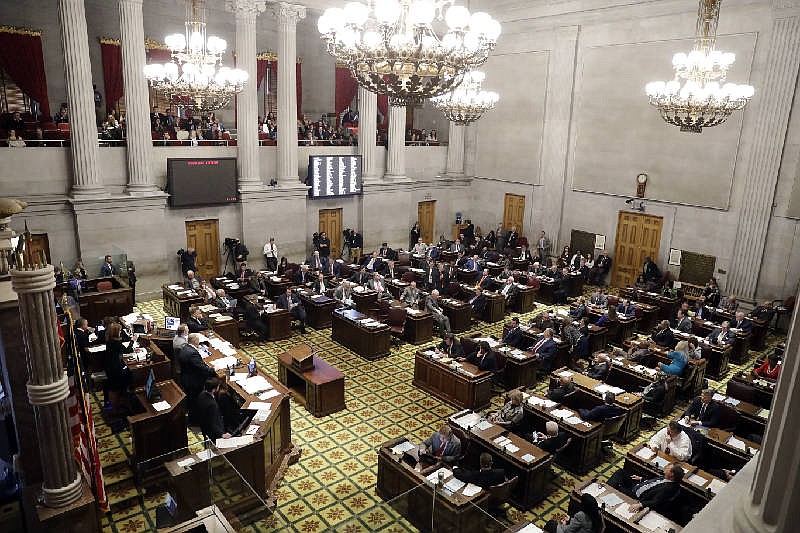NASHVILLE - The Republican-led Tennessee House voted Monday to include public restrooms, dressing rooms and locker rooms in the state's public indecency laws, prompting warnings from Democratic critics that the state could be setting itself up for economic boycotts.
Representatives voted 69-25 for the bill, which although watered down from its original version still prompted some concerns from the LGBTQ community and others.
The House then passed two other controversial bills, one a measure that seeks to bar state funding for health care clinics that provide abortion services by declaring abortion on demand is a tenet of "secular humanism," which the measure says is a religion.
A third bill passed by the House seeks to begin requiring smaller businesses employing between 25 and 50 workers to start using E-Verify system checks on prospective hires to ensure they are lawfully in the U.S. Current law requires the checks on employers with more than 50 workers.
All three bills are pending in the Senate.
Earlier, Rep. John Ragan, R-Oak Ridge, the bathroom bill's sponsor, said that as amended his measure "simply adds clarity to definitions but otherwise leaves indecent exposure laws unchanged.
"Clarity in the law is paramount if ordinary citizens are expected to read and obey it," Ragan said.
During the ensuing debate, House Democratic Caucus Chairman Mike Stewart told Ragan that while Ragan argued the bill "doesn't really make any change to the law, what it does is for the first time really focus on bathrooms and similar places as a focus where we don't have indecent exposure."
Ragan replied that the bill would include restrooms, showers, locker rooms and similar facilities "designed for multi-person, single-sex use."
"That's my concern," Stewart said, adding that "obviously Tennessee can do things that are not thoughtful. And we can probably get away with it for 25 years. One day we wake up and we're Ohio and Michigan and no one wants to come here and bring jobs."
Stewart cited North Carolina's experience after passing its 2016 law. It pre-empted anti-discrimination ordinances passed by local governments and also required schools and public facilities with single-gender restrooms to restrict them to people whose sex, as listed on their birth certificates, corresponded to the facilities' designated uses.
As a result, North Carolina faced a number of boycotts. Stewart pointed to an economic impact study conducted by The Associated Press that estimated $3.76 billion in lost business in 2017.
"They lost many, many national concerts such as Bruce Springsteen and Ringo Starr," Stewart said. "They lost the NCAA basketball championship. The 2019 NBA All-Star game and multiple businesses chose not to relocate to North Carolina."
Majority Leader William Lamberth, R-Portland, rushed to Ragan's defense, saying the bill would provide public protections.
"This bill literally is for the purposes of our criminal law" and "bans public acts of sex in our bathrooms," Lamberth said. "If you're not for that, what are you down here for? [If] some business is in support of that type of behavior I don't want them here."
Chris Sanders, executive director of the Tennessee Equality Project, said House Bill 1151 "has been amended to remove the portions in the original bill directly targeting transgender people."
But Sanders said "concerns remain about the impact on the transgender community if it becomes law, given the long history of harassment of transgender people in restrooms. In committee hearings, legislators stated that the amended bill simply clarifies and restates existing law. If that is the case, there is no good reason to proceed. The Senate should drop this bill, given all the fear it has generated."
Last month, a transgender minister from Chattanooga testified in committees against the bill, saying she was fearful of what impacts the bill would have.
The abortion bill, also sponsored by Ragan, is called the "Life Appropriations Act." It would block state funding for groups like Planned Parenthood "only to the extent" allowed by the federal government if the U.S. Supreme Court would allow it.
"Quite simply, this is simply clarifying the law to make sure Tennessee doesn't engage in religious favoritism" when it comes to "convenience abortions," Ragan said.
Rep. John Ray Clemmons, D-Nashville, objected, saying, "Convenience abortion? I'm wondering what garbage can you pulled this definition from and what state?"
Ragan replied, "I would advise my distinguished colleague from Nashville to use more respectful language."
Rep. Gloria Johnson, D-Knoxville, said "as many as people I talk to, there's nothing 'convenient' about having an abortion." She called it "horrifying to me that we're going to pass legislation that shames women."
The measure, House Bill 1490, passed on a 66-24 vote.
Rep. Bruce Griffey, R-Paris, sponsored an undocumented immigration measure requiring E-Verify checks for many small businesses. That bill, House Bill 1239, passed 57-27.
Contact Andy Sher at asher@timesfreepress.com or 615-255-0550. Follow on Twitter @AndySher1.
